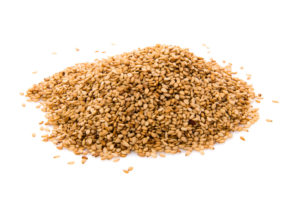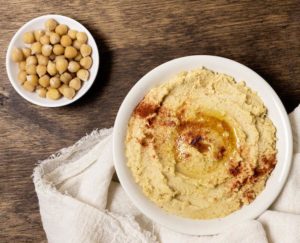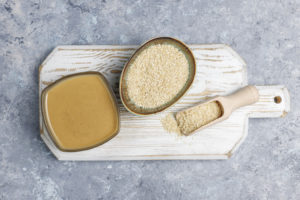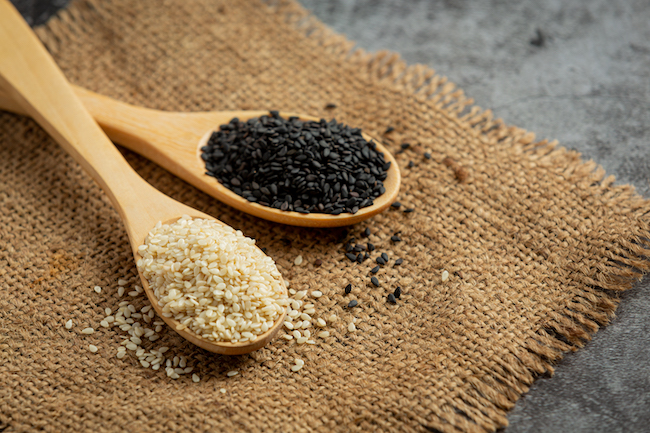For a lot of Chefs, their first encounter with sesame seeds probably came with a “jingle” that went: “Two all-beef patties, special sauce, lettuce, cheese, pickles, onions, on a…”
And you know the rest.

Of course, later in life, you learn that the LEAST of what sesame seeds can offer to the culinary world…
Is a topping on a bun.
But the fact remains that at one time, the vast majority of the sesame seed crop of Mexico went directly to McDonalds for toppings on their famous hamburger buns.
You still see sesame seeds on some bakery products in the United States but our country is nowhere near the leading importer of sesame seeds, nor its uses.
Sesameis a flowering plant grown in tropical regions around the world and is cultivated for its edible seeds, which grow in pods.
Sesame is thought to be the oldest oil-seed crop known to humanity and has one of the highest oil contents of any see and world production of sesame seeds in 2018 was 6 million metric tons.

Interestingly, the top exporters of sesame seeds are India, Burma, Sudan Tanzania, China and Pakistan and India.
The top importers of sesame seeds are China, Turkey, Japan, South Korea and Israel.
From a nutrition perspective, eating sesame seeds have many “potential” health benefits and was once thought to have mystical powers, as first mentioned in the command “Open sesame!,” used in the Arabian Nights tale of “Ali Baba and the Forty Thieves.”
Albeit a poorly remembrance of the actual command, which was, “open says me”, (which opened the secret cave’s entrance), “Open Sesame!” made its way into common expression anyway.
Many studies have extolled sesame seeds virtues since, due to the numerous vitamins and minerals they contain. The health benefits of sesame seeds seem almost endless. A few highlights include claims such as reducing your risk of heart disease, certain cancers, obesity, bone health, type 2 diabetes, and the list goes on.
Unfortunately, other studies say that you REALLY love sesame seeds in order to see any significant results from eating sesame seeds.
Like handfuls a day.
With a rich, nutty flavor, it’s no wonder that sesame seeds are used as garnishment and in foods all over the world.
From toppings on breads to thickeners in soups and savory dishes, sweets and coffee-like drinks with exotic names like: ”Benne”, Wangila, Chikki, Halvah, Goma-Dofuand and in Za’atar, there’s no shortage of recipes and spice blends that use this diverse seed.
But perhaps the most well-known food product that uses sesame seeds is Tahini, a paste made from sesame seeds and a key ingredient in the classic dip, Hummus.

Hummus, the Turkish word for mashed chick pea, is one of the oldest (prepared) foods, dating back to ancient Egypt.
There was time, that if you loved hummus, you’d probably only find it in a local specialty store, or hidden somewhere in the back aisles of one of the more popular national chains.
Today, it’s one of THE most popular dips in America.
You can of course buy Tahini to make your hummus but it’s SO easy to make and tastes infinitely better so why not make it yourself.

The recipe is below but you can watch it being made right here!
Tahini
Makes 3 Cups
1 Cup Sesame Seeds
¼ to 1/3 Cup Olive Oil
- Place the sesame seeds (by themselves), in a frying pan or skillet on medium low heat, stirring often until the sesame seeds begin to lightly color and give off a toasty aroma.
- Remove the seeds from the heat and fully cool.
- Place the seeds in a food processor and blend until a paste is created.
- Add the olive oil in 2 or 3 stages, scraping down between each addition.
- Blend until the desired smoothness is achieved.
Classic Hummus
Makes 3+ Cups
2 – 16 oz Cans Canned Chick Peas
1 to 2 teaspoons Garlic, Fresh, Chopped
1/3 Cup Tahini Paste
½ Lemon, Freshly Squeezed Juice
3 TBSP Olive Oil
1/3 Cup Cold Water (Or More as Needed)
1 tsp Sea Salt (or Kosher Salt)
1/4 tsp Hot Sauce (Tabasco or Other)
- Drain off all liquids from the canned chick peas and rinse well with cold water to remove all of the canned juices.
- Add chick peas to a food processor using an “s” blade attachment.
- Add the fresh garlic, tahini paste, lemon juice and olive oil.
- Blend on medium then high speed 1 to 2 minutes, stopping occasionally to scrape down the sides of the bowl. You want to make this paste rather smooth before adding the water.
- Begin adding the cold water in 2 to 3 steps, blending each time and scraping down the sides of the bowl between additions. The resulting hummus should be smooth and creamy looking and easily hold its shape when mounded.
- When you feel you have the consistency you want, add the salt and hot sauce and blend one last time for 15 to 30 seconds.
To the recipe above, once finished, you can blend in, OR add other ingredients, as toppings. These are a few of our favorites.
- Black Beans with a Dusting of Red Goose Chili Powder, Ground Cumin, Sweet Corn & Chopped Tomato
- Diced Roasted Red Peppers Sprinkled with Red Goose Cajun VooDoo Seasoning
- Kalamata Olives with Fresh Chopped Rosemary and Red Goose Mediterranean Spiced Sea Salt


Pingback: buy cheap androxal australia cheap
Pingback: enclomiphene en ligne
Pingback: how to buy rifaximin usa buying
Pingback: buy cheap xifaxan american express
Pingback: staxyn with doctor consult
Pingback: get avodart usa online pharmacy
Pingback: dutasteride by mail
Pingback: cheap flexeril cyclobenzaprine overnight
Pingback: order gabapentin uk cheap purchase buy
Pingback: order fildena generic from the uk
Pingback: canadian cheap itraconazole
Pingback: koupit online kamagra
Pingback: sans ordonnance kamagra distribuer